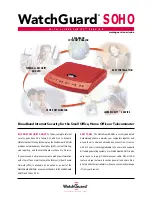
Chapter 28 Anti-Spam
USG20(W)-VPN Series User’s Guide
436
configured black list helps catch spam e-mail and increases the USG’s anti-spam speed and
efficiency.
SMTP and POP3
Simple Mail Transfer Protocol (SMTP) is the Internet’s message transport standard. It controls the
sending of e-mail messages between servers. E-mail clients (also called e-mail applications) then
use mail server protocols such as POP (Post Office Protocol) or IMAP (Internet Message Access
Protocol) to retrieve e-mail. E-mail clients also generally use SMTP to send messages to a mail
server. The older POP2 requires SMTP for sending messages while the newer POP3 can be used with
or without it. This is why many e-mail applications require you to specify both the SMTP server and
the POP or IMAP server (even though they may actually be the same server).
The USG’s anti-spam feature checks SMTP (TCP port 25) and POP3 (TCP port 110) e-mails by
default. You can also specify custom SMTP and POP3 ports for the USG to check.
E-mail Headers
Every email has a header and a body. The header is structured into fields and includes the
addresses of the recipient and sender, the subject, and other information about the e-mail and its
journey. The body is the actual message text and any attachments. You can have the USG check for
specific header fields with specific values.
E-mail programs usually only show you the To:, From:, Subject:, and Date: header fields but there
are others such as Received: and Content-Type:. To see all of an e-mail’s header, you can select an
e-mail in your e-mail program and look at its properties or details. For example, in Microsoft’s
Outlook Express, select a mail and click
File > Properties > Details
. This displays the e-mail’s
header. Click
Message Source
to see the source for the entire mail including both the header and
the body.
E-mail Header Buffer Size
The USG has a 5 K buffer for an individual e-mail header. If an e-mail’s header is longer than 5 K,
the USG only checks up to the first 5 K.
DNSBL
A DNS Black List (DNSBL) is a server that hosts a list of IP addresses known or suspected of having
sent or forwarded spam. A DNSBL is also known as a DNS spam blocking list. The USG can check
the routing addresses of e-mail against DNSBLs and classify an e-mail as spam if it was sent or
forwarded by a computer with an IP address in the DNSBL.
Finding Out More
See
for more background information on anti-spam.
28.2 Before You Begin
• Before using the Anti-Spam features (IP Reputation, Mail Content Analysis and Virus Outbreak
Detection) you must activate your Anti-Spam Service license.
Summary of Contents for ZyWall USG20-VPN
Page 17: ...17 PART I User s Guide ...
Page 18: ...18 ...
Page 99: ...99 PART II Technical Reference ...
Page 100: ...100 ...











































